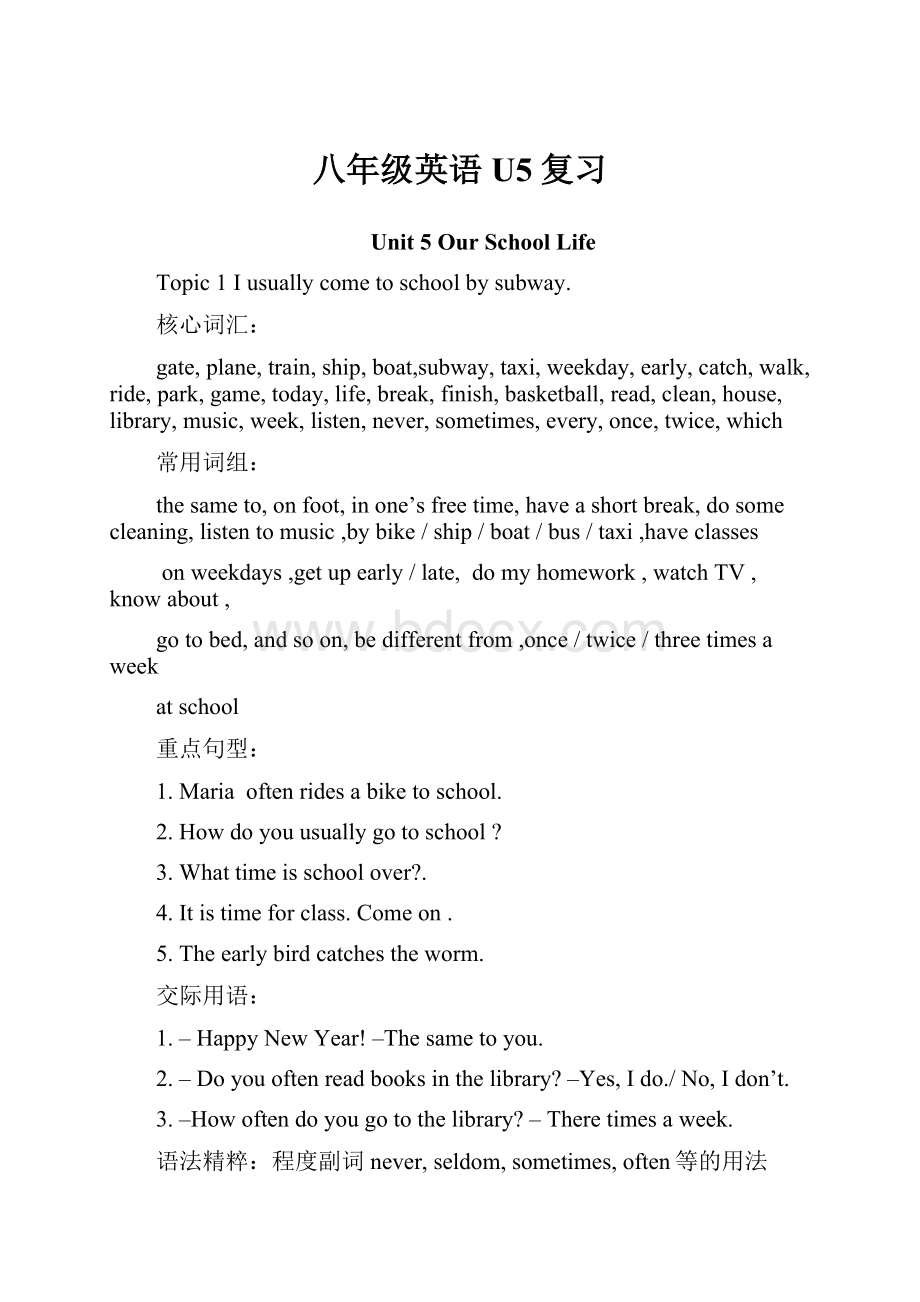八年级英语U5复习.docx
《八年级英语U5复习.docx》由会员分享,可在线阅读,更多相关《八年级英语U5复习.docx(23页珍藏版)》请在冰豆网上搜索。

八年级英语U5复习
Unit5OurSchoolLife
Topic1Iusuallycometoschoolbysubway.
核心词汇:
gate,plane,train,ship,boat,subway,taxi,weekday,early,catch,walk,ride,park,game,today,life,break,finish,basketball,read,clean,house,library,music,week,listen,never,sometimes,every,once,twice,which
常用词组:
thesameto,onfoot,inone’sfreetime,haveashortbreak,dosomecleaning,listentomusic,bybike/ship/boat/bus/taxi,haveclasses
onweekdays,getupearly/late,domyhomework,watchTV,knowabout,
gotobed,andsoon,bedifferentfrom,once/twice/threetimesaweek
atschool
重点句型:
1.Mariaoftenridesabiketoschool.
2.Howdoyouusuallygotoschool?
3.Whattimeisschoolover?
.
4.Itistimeforclass.Comeon.
5.Theearlybirdcatchestheworm.
交际用语:
1.–HappyNewYear!
–Thesametoyou.
2.–Doyouoftenreadbooksinthelibrary?
–Yes,Ido./No,Idon’t.
3.–Howoftendoyougotothelibrary?
–Theretimesaweek.
语法精粹:
程度副词never,seldom,sometimes,often等的用法
课文重要语言点:
1.HappyNewYear!
Thesametoyou!
新年快乐!
同喜同乐!
Thesametoyou!
意为:
也同样祝你…..,用于公共节日、假日时别人向你祝福时的回应。
注意:
Happybirthday!
回答应为Thankyou!
2.Howdoyouusuallycometoschool?
你通常怎样来学校?
How引导的特殊疑问句用来询问去某地的交通方式。
bysubway意为:
乘地铁,by+表示交通方式的名词,意为"骑""乘""坐",其后接不加任何修饰语的交通工具名称。
乘坐交通工具还可以用take+a(an)/the+表示交通工具的单数名词
类似的短语:
in/on+a(an)/the/this/one’s+表示交通工具的单数名词
Ialwayscometoschoolbybus.
by+交通工具名称,表示使用某种交通方式,中间不加限定词,如果交通工具前有a,the,my等限定词,就不能用by,而是用in或是on.on+the\a\+交通工具单词,in+the\a\one’scar
takethe\abus\train\subwayto---
=goorcometoaplacebybus
ridethe\abiketoschool=cometoschoolbybike
walktothepark=gototheparkonfoot
flytoaplace=gotoaplacebyplane
onthetrain=bytrainonhisbike=bybikeinmycar=bycar.
3.Howoftendoyougotothelibrary?
你多久去一次图书馆?
howoften“多久一次”,问频率。
答语常用频度副词never,always,often等或单位时间内的次数onceaweek一周一次twiceamonth每月两次threetimesayear每年三次
4.sometimes,sometime,sometimes的区别:
sometimes有时,sometime一些时间,sometimes几次
Sometimesweplaybasketball,andsometimesweplaysoccer.
有时候我们打篮球,有时候我们踢足球。
Ihavesometimetodomyhomeworkatschool.我有一些时间在学校做家作。
Ireadbooksinthelibrarysometimesamonth.我每个月在图书馆读几次书。
5.it’stimeforclass.到上课时间了。
it’stimefor+名词=it’stimetodosth.到了做…的时候
6.Theyoftenplaybasketballorsoccer,goswimmingandsoon.
goswimming去游泳 andsoon“等等”,表示还有很多。
拓展go+v.-ing表示去做某事,
类似的有:
gofishing去钓鱼goshopping去买东西
goboating去划船goskating去滑冰
巧辩异同 afew与fewafew“一些”,few“很少,几乎没有”,修饰可数名词。
alittle与little alittle“一些”,little“很少,几乎没有”,修饰不可数名词。
一般现在时:
●概念:
经常、反复发生的动作或行为及现在的某种状况。
表示经常的或习惯性的动作,常与表示频度的副词连用。
常用的频度副词有:
always、often、usually、seldom、never。
频度副词在句中通常放在行为动词之前,系动词、助动词之后。
例如:
Heoftengoesswimminginsummer.他夏天经常游泳。
Iusuallyleavehomeforschoolat7everymorning.每天早上我七点离开家。
2)表示现在的状态。
例如:
Myfatherisatwork.Heisverybusy.我父亲在工作,他很忙。
Theboyistwelve.这男孩十二岁。
3)表示主语具备的性格、特征和能力等。
例如:
Allmyfamilylovefootball.我全家人都喜欢足球。
Mysisterisalwaysreadytohelpothers.我妹妹总是乐于助人。
AnnwritesgoodEnglishbutdoesnotspeakwell.安英语写得不错,讲的可不行。
4)表示客观真理,客观存在,自然现象。
例如:
Theearthmovesaroundthesun.地球绕太阳转动。
ShanghailiesintheeastofChina.上海位于中国东部。
5)表示按计划或安排好的,或将要发生的动作,可用一般现在时表将来。
但只限于start,begin,leave,go,come,arrive,return,takeplace等。
例如:
Thetrainleavesatsixtomorrowmorning.火车明天上午六点开。
●时间状语:
always,usually,often,sometimes,everyweek(day,year,month…),onceaweek,onSundays,
●基本结构:
①be动词;②行为动词
●否定形式:
①am/is/are+not
②此时态的谓语动词若为行为动词,则在其前加don't,如主语为第三人称单数,则用doesn't,同时还原行为动词。
●一般疑问句:
①把be动词放于句首
②用助动词do提问,如主语为第三人称单数,则用does,同时,还原行为动词。
句型转换:
1)主语为第三人称单数,否定句,在动词前加doesn’t,再把动词改回原形,一般疑问句,在句首加does,再把动词改回原形,回答,Yes,人称代词+does。
/No,人称代词+does+not。
Shehassmalleyes.
Shedoesn’thavesmalleyes.
Doesshehavesmalleyes?
Yes,shedoes./No,shedoesn’t.
2)主语为除第三人称单数之外的人称,否定句,在动词前加don’t,一般疑问句,在句首加do,回答,Yes,人称代词+do./No,人称代词+do+not。
Theyhavesmalleyes.
Theydon’thavesmalleyes.
Dotheyhavesmalleyes?
Yes,theydo./No,theydon’t.
肯定式:
Igotoschoolonfoot.否定式:
Idon’tgotoschoolonfoot.
疑问式:
Doyougotoschoolonfoot?
—Yes,Ido.—No,Idon’t.
当主语是第三人称单数时,动词用第三人称单数形式,在词尾加-s或-es。
肯定式:
Hegoestoworkbybus.否定式:
Hedoesn’tgotoworkbybus.
疑问式:
Doeshegotoworkbybus?
—Yes,hedoes.—No,hedoesn’t.
当主语是第三人称单数时,谓语动词需加-s或-es:
情况
构成方法
读音
例词
一般情况
加-s
清辅音后读/s/
浊辅音和元音后读/z/
swim-swims;help-helps;like-
likes
以o结尾的词
加-es
读/z/
goes,does
以s,sh,ch,x等结尾的词
加-es
读/iz/
watches
以辅音字母+y结尾的词
变y为i再加es
读/z/
study-studies
不规则变化have和be动词
变have为has
变be为am,is,are
have-has
be-am,is,are
频率副词(always,often,seldom,never,usually)在句中的位置:
1.通常放在行为动词前面。
Heneverdoeshomeworkathome.他从没在家里做作业。
2.放在系动词be或can,may,will等情态动词或助动词的后面。
Sheisseldomlate.她很少迟到。
Shewillalwaysbehereontime.她将会一直按时到这的。
3.sometimes可以放在句首,也可以放在句中或句末。
Sometimestheboycries.=Theboysometimescries.=Theboycriessometimes.这男孩不时地哭。
4.veryoften,quiteoften加强语气时,要放在句末。
Ihaven’tbeenthereveryoften.我并不常去那儿。
5.seldom,never可以放在句首,表示加强语气,但句子要倒装。
SeldomcanIswim100meters.我很少能游100米远。
NeverhaveIbeentoXi’an.我从没去过西安。
课堂练习
一、用括号内动词的适当形式填空。
1.Heoften (have)dinnerathome.
2.DanielandTommy (be)inClassOne.
3.We (notwatch)TVonMonday.
4.Nick (notgo)tothezooonSunday.
5. they (like)theWorldCup?
6.What theyoften (do)onSaturdays?
7. yourparents (read)newspaperseveryday?
8.Thegirl (teach)usEnglishonSundays.
9.SheandI (take)awalktogethereveryevening.
10.There (be)somewaterinthebottle.
二、按照要求改写句子
1.DanielwatchesTVeveryevening.(改为否定句)
2.Idomyhomeworkeveryday.(改为一般疑问句,作否定回答)
3.Shelikesmilk.(改为一般疑问句,作肯定回答)
4.Amylikesplayingcomputergames.(改为一般疑问句,作否定回答)
5.Wegotoschooleverymorning.(改为否定句)
词汇部分。
(10分)
(A)根据句意及首字母提示,在空白处填入适当的单词。
41.—Oh,it’s4:
30p.m.Schooliso_____.Let’sgohome.
—Allright.Let’sgo.
42.—DoesJaneoftenreadbooksinthel_____?
—Sorry,Idon’tknow.
43.LinDandoesn’tlikereadingbooks.Healwaysl_____tomusic.
44.—Howoftendoyougotothepark,Jane?
—O_____aweek.
45.—Whattimedoclassesb____inthemorning?
—Attentoeight.
(B)根据句意,用括号内所给单词的适当形式填空。
46.—WhatdoesEllenusuallydoafterschool?
—Sheusually_____(watch)TV.
47.—Howdo_____(America)studentsusuallygotoschool?
—Well,theyusuallywalkortakeayellowschoolbustoschool.
48.Bettywritestohisfather_____(two)aweek.
49.Heusuallygoes______(swim)inhisfreetime.
50.YuJingsometimes_____(ride)abiketoschool.
Ⅱ.句型转换。
(每空一词)(5分)
51.Theoldmanalwayswalkstotheshop.(改为否定句)
Theoldman__________totheshop.
52.Mikeoftengoestothezoobybus.(改为同义句)
Mikeoften_____a_____tothezoo.
53.Mrs.Readgoesshoppingthreetimesaweek.(对画线部分提问)
__________doesMrs.Readgoshopping?
54.IusuallyreadbooksonSundays.(对画线部分提问)
_____doyouusually_____onSundays?
55.MariaoftenvisitstheGreatWall.(改为一般疑问句)
_____Mariaoften_____theGreatWall?
Topic2Afewstudentsarerunningaroundtheplayground.
核心词汇:
playground,lab,room,classroom,building,pool,card,soon,physics,borrow,shelf,course,keep,return,pleasure,wallet,money,because,talk,Japanese,wonderful
常用词组:
ofcourse,lostandfound,inthecenterof,nextto,ontheplayground,atthemoment,lookfor,return…to…,between…and…,talkwith/to…,theGreatWall,atthebackof…
重点句型:
1.Helikesplayingsoccerbest.
2.Heissleepingatthemoment.
3.Wouldyouliketoplaybasketball?
4.MayIborrowafewRen’aiprojectEnglishworkbooks?
5.Youmustreturnthemontime.
6.HowlongcanIkeepthem?
7.Helookshappy,becausehelovesswimming.
交际用语:
1.–Areyoudoingyourhomework?
–Yes,Iam./No,I’mnot.
2.–WhatdoesKangkanglikedoingbest?
–Helikesplayingsoccerbest.
3.–HowlongcanIkeepthem?
–Twoweeks.
4.–Thankyou.–It’sapleasure.
语法精粹:
现在进行时的用法。
课文重要知识点
1.MayIborrowafew……workbooks?
Ofcourse.
我可以借几本……练习册吗?
当然可以。
borrow,从对方处借来,常用句型:
borrowsth.fromsb.或borrowone’ssth.
Ioftenborrowbooksfrommyteacher.
lend意为:
借给,表示主语把东西借给别人,常用句型:
lendsth.tosb.或lendsb.sth.
Myteacheroftenlendssomebookstome.
2.HowlongcanIkeepthem?
Twoweeks.我能借多长时间?
两个星期。
howlong多长时间,用来提问一段时间
keep,意为:
借,表示借某物多久,强调要保留一段时间,习惯上用:
keepsth.for+时间段
Wecankeepthebooksfortwodays.
Ofcourse=sure=certainly.当然可以。
3.Youmustreturnthemontime.
return,及物动词,归还,相当于giveback。
return意为:
返回,回来,是不及物动词,相当于comeback
returnto+地点,表示:
回到…..地方,returnfrom+地点,表示:
从…..回来
HereturnedfromEnglandyesterday.
ontime意为:
按时,准时,常指火车、飞机等准时到达,强调不早不迟
intime意为:
及时,后面可以接forsth.或todosth.强调在规定的时间之前,以不迟到为标准。
4.IalsowanttogotheGreatWalloneday.我希望有一天去长城。
also,“也”,正式用语,用于肯定句中,放在行为动词之前,系动词或助动词之后。
too,“也”,用于肯定句中,放在句末。
Heisastudent,too.
either,“也”,用于否定句中,放在句末,
Hecan’tswim,either.
aswell一般用于肯定句句末,但不用逗号隔开
Shecanrideabikeaswell.
5.HeistalkingtoaJapanesegirlontheGreatWall.
talkto意为:
与….谈话,还可以用:
talkwith
巧辩异同talk,say,speak与tell
(1)talk“交谈”,表示通过谈话方式交换意见、消息等。
(2)speak“说话”,强调开口发声,后常接某种语言。
(3)say“说”,强调所说的话的内容。
(4)tell“告诉”,有时兼含“嘱咐”“命令”等。
tellatruth说真话,tellalie说谎,tellastory讲故事等固定搭配。
6.Whatareyoudoingnow?
I’mlookingformypurse.你现在在做什么?
我正在找我的钱包。
lookfor“寻找”,强调寻找的过程;find“找到”强调找的结果。
WhatisMariadoingnow?
Sheisreadin